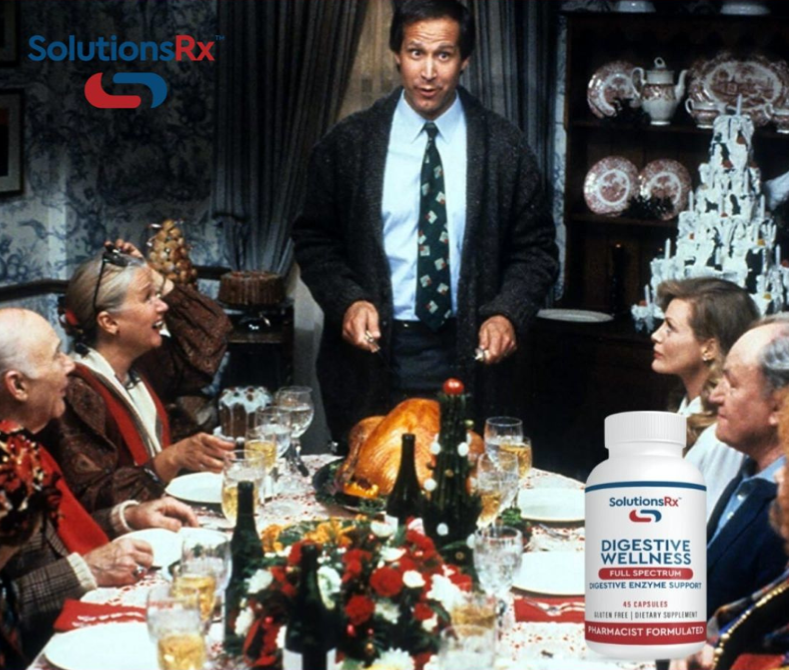There is no item in your cart
Many people look forward to the holidays so they can eat lots of good food; however, most of those people overeat. When we overeat, our bodies produce digestive enzymes that metabolize food. Since our eating habits change over the holidays, let me give you some tips to overcome the temptation of “cheat meals”.
Tip #1: Don’t skip breakfast.
Credit: Dr. Seuss Enterprises
Skipping meals to save for a lavish dinner can cause diculties in managing blood sugar levels, leading to overeating due to excessive hunger. For example, if you keep the same eating schedule, your body knows when to expect sustenance, but once you skip a meal, the body no longer knows when it will be replenished next. Because of this, breakfast is known to play a huge role in metabolism. Too, breakfast usually contains important dietary components and maps out the rest of the day in terms of food. For some, skipping breakfast is detrimental to health. Eating breakfast can improve cognition, especially memory and focus.
Tip #2: Choose the right plate.
Credit: Walt Disney Company
If you are like me, you were taught to “make a happy plate”, meaning everything that goes onto your plate should be eaten. With that, I have found what helps to control portion sizes of foods when you are accustomed to “making a happy plate” is choosing a smaller plate. Choosing a salad plate over a dinner plate will make your choice of food appear larger and also prevents you from loading so much onto the plate. Controlling portion sizes is important because bigger portion sizes cause blood sugar to rise, making it harder to manage.
Tip #3: Be picky.
Credit: Warner Bros. Entertainment Inc.
Holiday eating is mostly done buet style so before you start piling dishes onto your plate, scan the table and see what is being served. This allows you to see everything and choose beforehand what you like best so there are no surprises of “Oh, I didn’t see that one. I’ll get that next.” Too, be mindful of where you are seated. If you’re seated far from the plethora of holiday dishes or even seated with your back to it, you’ll less likely be compelled to make multiple trips. If you do decide to go back for seconds, wait about 15 minutes between firsts and seconds. Science shows that it takes the brain about 20 minutes to realize the stomach is full. Because of this, you should also eat leisurely to allow the brain enough time to catch up to the stomach.
Tip #4: Balance your plate.
Credit: Warner Bros. Entertainment Inc.
We elves like to stick to the four main food groups: candy, candy canes, candy corn, and syrup
Fill your plate with the following:
1⁄2 plate – vegetables and fruits (more vegetables than fruit) 1⁄4 plate – whole grains
1⁄4 plate – healthy proteins
Holiday foods might make this dicult to do as most dishes are made as a casserole (especially in the South!). When the dish isn’t a casserole, it likely has a carb-filled sauce for it or someone’s reaching for the salt! I urge you to stay away from the ooey gooey sauces that are so tempting and to put down the salt shaker! Too much salt can lead to high blood pressure, which has its own complications, but the takeaway from this tip is to try to fill up on vegetables and fruits first as they tend to have vitamins and minerals as well as fibers that make you feel full for longer.
Tip #5: Don’t drink all your calories.
Credit: The Carsey-Werner Company
If your holiday parties consist of drinks and cocktails or even sodas, you should make sure you’re not drinking all your calories. A cup of store-bought eggnog contains an estimated 224 calories and homemade eggnog can have even more than 500 calories. A cup of hot chocolate averages 160 calories and that’s without the fun toppings. Alcoholic mixed drinks and punches can be filled with sugar which, as you know, contains a lot of calories. The cocktails containing the most sugar are eggnog, mudslides, white Russians, daiquiris, and margaritas. Some subtle changes to the recipes can help you to keep from drinking all your calories, but ultimately, it’s best to stay away from them. A good practice to adopt when drinking during the holidays is to have a calorie-free option or non-alcohol choice.
Tip #6: Digest well!

Credit: Dr. Seuss Enterprises
Because it is easy to give into temptation, you should have reinforcements! This holiday season, put Digestive Wellness in your arsenal! Digestive Wellness is a full spectrum of digestive enzymes designed to support healthy digestion by helping the body break down food and absorb essential nutrients. Digestive Wellness contains enzymes that are known to reduce constipation, relieve indigestion, bloating, and gas, and support the digestive system. This holiday, I urge you to have Digestive Wellness nearby so that your holiday eating habits don’t cause you to be uncomfortable and miss opportunities to be fully present with your family and friends.






